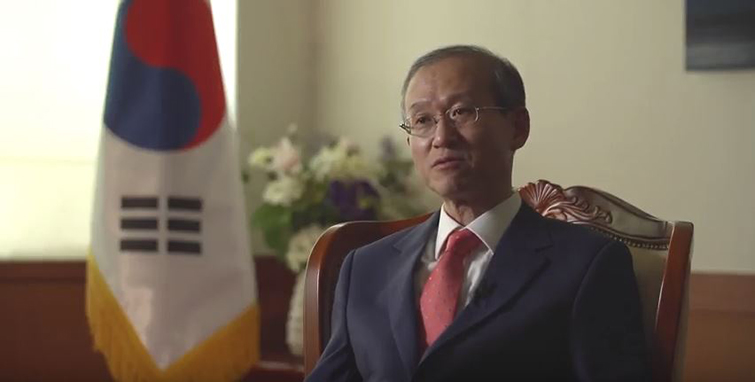-
About the Ministry
About the Ministry
- Press
- Countries & Regions
- Policy Information
- Life In Korea
Ministry News
- Notices
- Ministry News
- Press Releases
- Press Briefings
- Speeches & Published Materials
- Newsletter Service
- Diplomatic White Paper
1st VICE FOREIGN MINISTER's INTERVIEW WITH BBC (4.26.)
- Date
- 2018-04-27
- hit
- 2326
Click the photo to see the video
1ST VICE FOREIGN MINISTER'S INTERVIEW WITH BBC (April 26)
[Vice Minister Lim] Well, just in recent years, think about what happened on the Korean Peninsula: multiple launches of missiles and nuclear testings by North Korea and like out of the blue, we are beginning the process of engagement; we are talking to them face to face; and finally tomorrow, there will be the first summit meeting between President Moon and Chairman Kim in Panmunjeom.
[Rupert Wingfield-Hayes] Some of critics of your government might say there's quite a wishful thinking involved here, because essentially apart from some statements, Kim Jung-un has really given up nothing in order to get to this summit.
[Vice Minister Lim] Well, I believe, still, the announcement made by Pyeongyang on 20th April, which includes the suspension of the nuclear testings and missile launches as well as the shutdown of the nuclear testing site in the northern part of North Korea speaks volumes about the direction where the North Koreans will go in terms of the denuclearization and when they come to talks with us and with the Americans, but, of course, we will not jump to the conclusions regarding the denuclearization. We will be serious, we will be very stubborn in talking with the North Koreans for the importance of the denuclearization of the Korean Peninsula.
[Rupert Wingfield-Hayes] Kim Jong-un at the end of last year was in a real corner. He was under potential threat of military strike from Trump administration, facing the toughest sanctions that North Korea had never faced. So, he had to find a way-out, and that's President Moon's government because it is pro-engagement. Was the one place, the one hope that Kim Jong-un has, finding a way through this international ever-tightening noose on his regime.
[Vice Minister Lim] Well, I don't agree with that kind of descriptions. I mean the strategy of Korea has been called the strategy of pressure and engagement. So, in other words, while we have been pressuring the North Korean regime through the full-pledged implementation of the UN Security Council resolutions, but at the same time, we have been offering a different path for Pyeongyang. And they are finally going on to the path.
[Rupert Wingfield-Hayes] President Trump will follow Friday’s summit with a summit on his own. A lot of people were very surprised that he agreed to this. How surprised was your government?
[Vice Minister Lim] Well, personally I was not surprised, because in a sense President Trump has been also very clear from the beginning (that) there could be a different path for the regime in Pyeongyang. He was talking about, at one point, a kind of conversation of hamburgers with the young leader in Pyeongyang. So, in a sense, he was sending a very balanced signal, indicating a crisis on the one hand, but indicating a completely different future -- a completely different avenue for the future of North Korea on the other hand. So, when President Trump was accepting the proposal for the talks between the DPRK and the US, I don't think I was surprised.





